LUKE MACFARLANE
On The Mark
Julliard-Trained Luke Macfarlane Harnesses The Power Of His Diverse Fan Base And Skill For Playing Luscious Leading Roles With Gay Rom-Com Bros, Another Hallmark Holiday, And A Star-Studded AppleTV+ Series To Come
PHOTOS BY DEAN ISIDRO
WORDS BY TAMARA RAPPA
Listen to the extended interview on episode 120 of the Story + Rain Talks podcast on Apple Podcasts, Spotify, and wherever you listen.
Tamara Rappa: You went to a performing arts school and then went to Juilliard, and graduated in 2003. When did you first know that you wanted to be an actor? Was there a turning point moment in your youth?
Luke Macfarlane: It's hard to pin it on one thing specifically, but I think the most pivotal thing in my life, has been a love of performance through music. I've always played the cello, and when I was in high school, I started playing in an orchestra. I always wanted to sit closest to the audience, so that people could really see me play. Which is a funny thing; in an orchestra, it's all about being one voice. I wanted to be seen as well. That sense of performance through my cello-playing was a really big part of it. And then a drama teacher in high school said, 'You know you can do this. You can become an actor.'
TR: Aside from acting, you have other creative pursuits. You do incredible wood work, you play instruments, you were in a band. I'm assuming you studied music and instruments, at Juilliard?
LM: I didn't. At Juilliard, you are either in dance, music, or acting. Sadly, we didn't get to collaborate with each other that much. The level of expectation is so high for all those disciplines that, you know, there's not much crossover.
TR: How did you make your choice?
LM: My cello playing was always at a high level, but to become a concert-level cellist means locking yourself in a practice room for six hours a day. I just didn't have that extra little thing. But it was wonderful to be around those people in my later life.
"I think the most pivotal thing in my life, has been a love of performance through music."
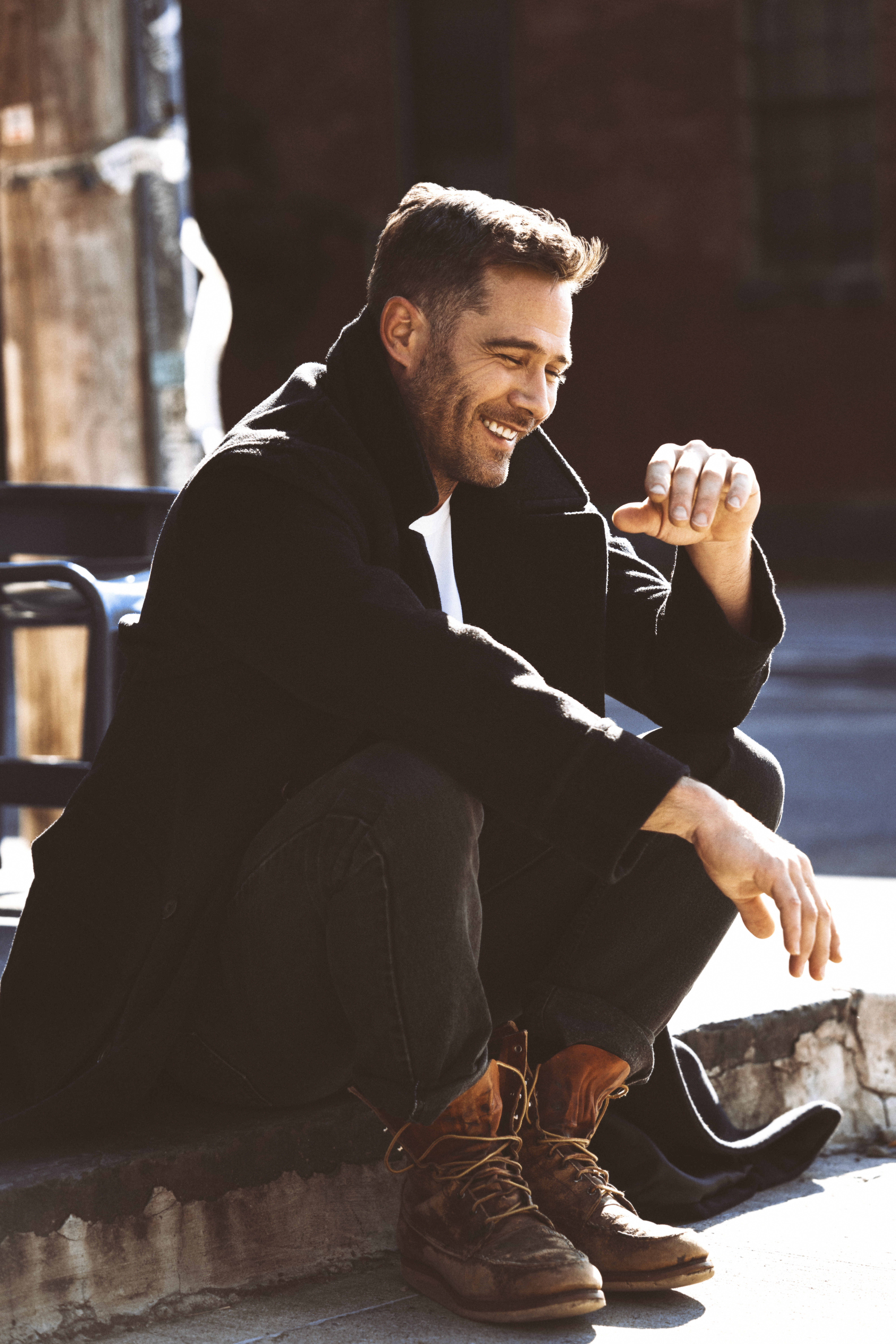
A B O V E P H O T O : V I n t a g e t s h I r t ; A G j e a n s . T H I S P H O T O : T e d d y V o n r a n s o n c o a t ; D o c k e r s t s h I r t ; v I n t a g e b o o t s .
"On so many levels, the metaphor of woodworking is key to my psychic health."
TR: How did you get into building and working with wood?
LM: My father was someone who was a very handy guy. He was not a woodworker by profession, he was an MD and a PhD. But so much of our bonding experience was through making things together, whether that was a gazebo in our backyard...and we actually did a kitchen renovation. I remember as a young kid, I always loved books, and wanted book shelves. So me and my father, when I was probably 10 or 11, built bookshelves for my room. That was very instrumental in my getting to know my way around a wood shop, and I continued it through my life. When I first moved to LA, I took it to the next level. I started working with a woodworking teacher down in Anaheim. Between gigs, I would drive down, and this teacher, William Ng, showed me how to take my work to the next level, to get into furniture design, building, and joinery. That really led me to a next level of woodworking.
TR: I could see that being a source of comfort for you. You're in LA, making your way, making your home, and trying to be settled. I would think that bringing that past time of yours to LA, felt really comforting and satisfying.
LM: Absolutely. Woodworking is a connection to the past, to my my father. It's a connection to nature. How does the grain of this wood work? It's a connection to the tactile, which is so different than what we have as actors. What we do is so ephemeral. I've done a lot of theater, and I remember early on in my acting career, after a play would close, you'd be struck with this incredible sadness. What you had made, had just kind of gone away.
TR: ...You put everything into this thing, and then you feel a void.
"What we do is so ephemeral. I've done a lot of theater, and I remember early on in my acting career, after a play would close, you'd be struck with this incredible sadness. What you had made, had just kind of gone away."
LM: Exactly. When you make something out of wood, especially if you make it well, it will last. It'll stick around. On many levels, the metaphor of woodworking is so key to my psychic health.
TR: From whom did you inherit your creative soul? I'm assuming your father, but are there other people in your family with whom your share your creative soul?
LM: Yes, my father was deeply creative. He was also an academic. My mother was doing a little family history-digging, and come to find out, my grandfather, my great-grandfather, and my great-great-grandfather, were all ministers. This idea of public speaking is very much a part of us. Itinerant ministers in Canada, early 18th century. These were people who didn't have churches. They would just sort of travel from town to town and speak about things. I was able to come across one of my great-grandfather's sermons. It was amazing to read it as a creative document. We're not fire-and-brimstone type of Christians. The sermon was actually about looking for God in nature. A beautiful, interesting thing to read.
TR: There's that connection to the woodworking hobby.
LM: Yes, woodworking, and also, performance. Standing in front of people and delivering an idea.
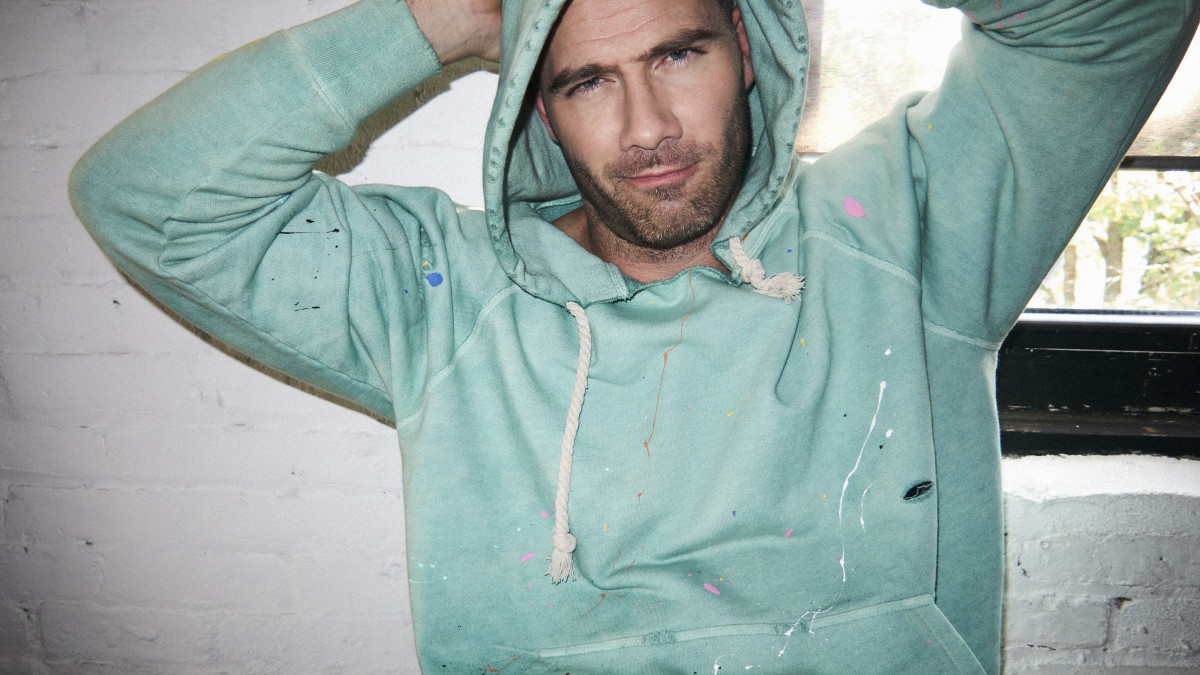
Camp Isidro hoodie.
"It was my first time at a big studio. It was my first time driving to Disney every day, and seeing Sally Field. 'Good morning, Sally Field!' I loved my character. And I loved Matthew Rys. We felt like we were doing something really cool."
TR: On set during our cover shoot we talked a little bit about Juilliard during that Y2K period when you were there. It was so good to be able to reminisce, and recall that time in New York City with you. What do you remember about that time, about where you lived? And what your days were like, and whom you were spending time with? What was inspiring you?
LM: I love this. It's so great to be nostalgic about that time. I moved there in, I guess it was 1999, to the Upper West Side. I stayed in the dorms. Juilliard had these little tiny dorms. The first roommate I was assigned, was an upright bass player who dreamed about playing in the New York Philharmonic. I don't know what happened to him and those dreams. It was the Upper West Side; Barnes + Noble; it was Fairway, it was Zabar's; it was Victoria's Secret. I remember running to school---I was always barely getting into class on time. We used to have to run by this Victoria's Secret that was on 64th and Broadway. You'd get this wave of like floral perfume...
TR: [Laughs] Victoria's Secret was such a big deal back then.
LM: Huge deal. And weirdly, whenever I get that smell, it always makes me think I'm late for class. It was great, and I had very little expectations of what it meant to be a professional artist living in New York. So I was open. I remember going to more plays than I'd ever gone to in my entire life, and going to see dance for the first time, and understanding how my craft as an actor related to dance. I remember always being encouraged to see and do; you can form your opinions later. Just absorb, absorb, absorb.
TR: How did you make your way to LA and did you feel prepared for it when you got there?
LM: The first gig that brought me to LA was this FX series called Over There, Steven Bochco, big time producer...Hill Street Blues, LA Law.
TR: TV magic at the time, Steven Bochco.
LM: Exactly. Big TV, and I'm really thinking, here it is. I'm going be famous now. One season later, thirteen episodes, and we were canceled. That's the first job that brought me to LA, as a series regular on a show. I didn't stick around for the first year, kind of like many Angelenos, I was like 'I miss New York', and went back to New York.
TR: Oh, you were that guy!
LM: I was that guy. I was living in like an apartment in LA, and it felt very different. So I moved back to New York, and did a play. While I was doing the play, I got Brothers + Sisters. I moved back to LA to do what I thought was going to be five episodes of a character. And lo and behold, 100 episodes later...
TR: It was so fun for me to re-watch Brothers + Sisters in preparation for this interview. There are a total of 110 episodes of Brothers + Sisters, of which you were in 89.
LM: I didn't know what [Brothers + Sisters] was going to be, and it was great. I knew Jon Robin Baitz, the creator of the show. I was just going to do a few episodes. It was my first time at a big studio. It was my first time driving to Disney every day, and seeing Sally Field. 'Good morning, Sally Field!' I loved my character. And I loved Matthew Rys. We felt like we were doing something really cool.
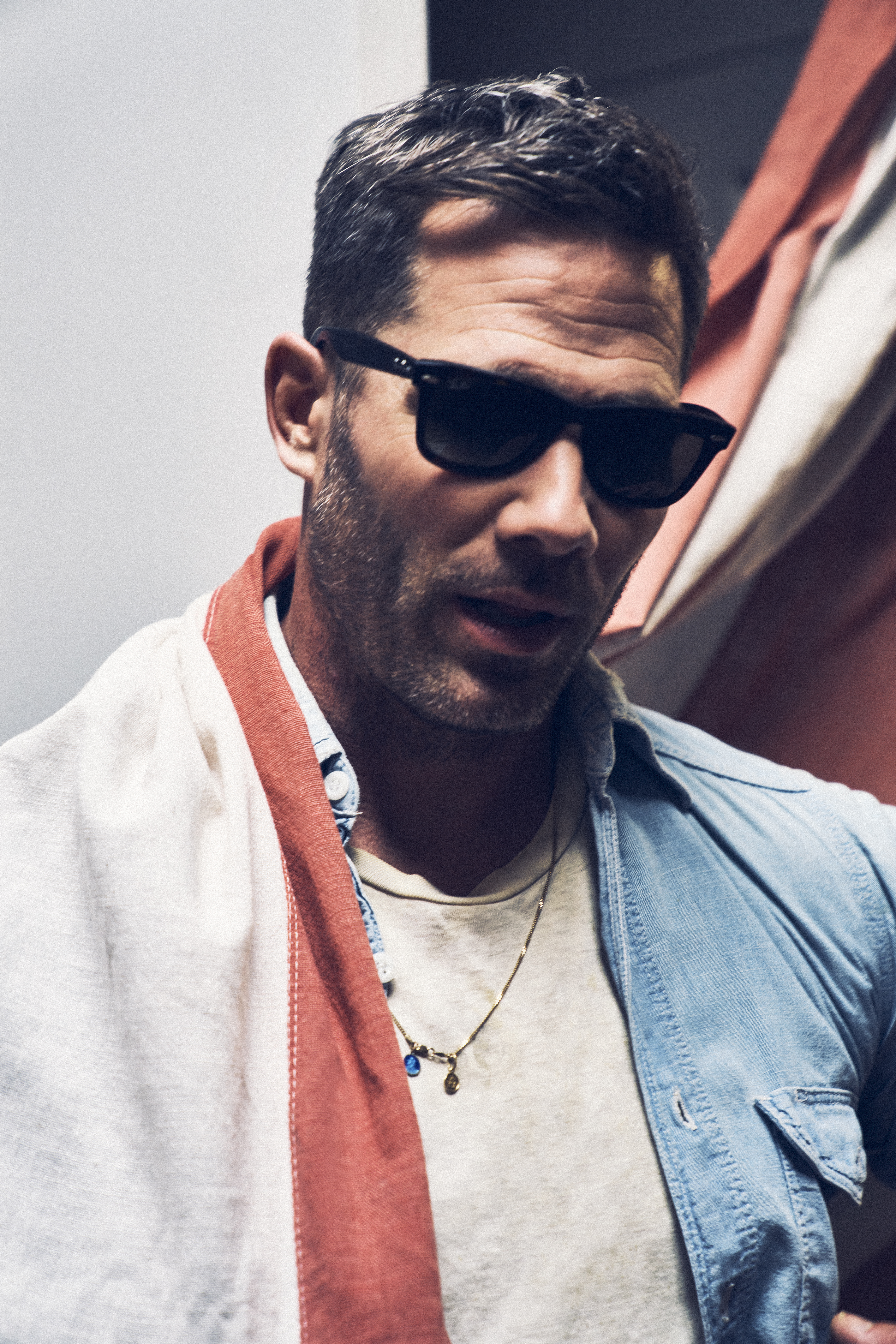 V I n t a g e s h I r t, t a n k, a n d n e c k l a c e.
V I n t a g e s h I r t, t a n k, a n d n e c k l a c e.
"As Canadians, we're raised that Canada is the best place to live. I used to believe that very much. It was the first time I really got to fall in love with America and Americans, and how they're different."
TR: Do you miss New York now, especially after spending time shooting Bros there? Would you ever move back to do theater, or for other reasons? You've consistently worked in theater over the years.
LM: Yes. I would love to go back and do some theater. I love New York. New York will always feel like where my creative life really started. It was also the first time I was around professionals who made their livings as artists. That will always be linked together with New York. New York was also the first American city I lived in. I'm Canadian. I can't understate the significance of that. As Canadians, we're raised that Canada is the best place to live. I used to believe that very much. It was the first time I really got to fall in love with America and Americans, and how they're different.
TR: New York will do that for you, right? You went straight to the heart of things! And you recently obtained American citizenship.
LM: I did. I went through the whole process. Me, in a room filled with about fifteen hundred people all swearing allegiance.
TR: Besides Bros, and Brothers + Sisters, and the Hallmark films, and you mentioned your first series, which of your past projects has had the biggest impression on you and why?
LM: I did this series for PBS, it was called Mercy Street. PBS had kind of gotten some new viewership because of Downton Abbey. I was a British import. The people at PBS and some producers, really wanted to do a version of an American Upstairs, Downstairs drama, and they picked the American Civil War. We did two seasons. Mary Elizabeth Winstead was the lead, she's brilliant, and it was about a civil war hospital. I played an army chaplain who was tending to the souls. I loved the character. I loved the show. It deepened my appreciation for the American experience and was fascinated by how it defined American identity. It was truly one of my favorite jobs to do, down in Richmond, Virginia.
TR: Where there's a lot of history...
LM: The heart of the Confederate capital. It was a really, truly, enjoyable thing, and a period piece, which I never thought I would get to play. I've often been told I look very modern, which is a weird thing.
TR: Really??
LM: I know. Weird, right?
TR: I feel like you could be very period in your look.
LM: Actually, I'd come off a job right before we started filming. I hadn't had a chance to grow my beard in, so they had to glue these mutton chops on me.
TR: You've been acting for about 20 years. It's a business that demands patience and self-imposed balance. There can be a flurry of work and then not, and then a flurry again. And there's an unpredictability to it, to how a given show or film will do, both with the audience and within the industry. How have you tried to attack practicing patience and balance, head-on?
LM: I think it's mostly about having a rich life outside of acting, whatever that means. For me, that includes having a very small but very loyal group of friends. I am still a phone talker. I am the kind of guy who calls up my best friend and just talks, you know? If they don't pick up, I leave a message saying, 'Hey, not calling for any other reason, but, call me back.' That is something that is tremendously, hugely, important. The phone conversation. And it's also about the hobbies we mentioned, the woodworking, the making of something permanent. I also bought an old house that I fixed up. It's the idea that there's always something to do, it's about finding something to do, constantly.
"I love New York. New York will always feel like where my creative life really started."
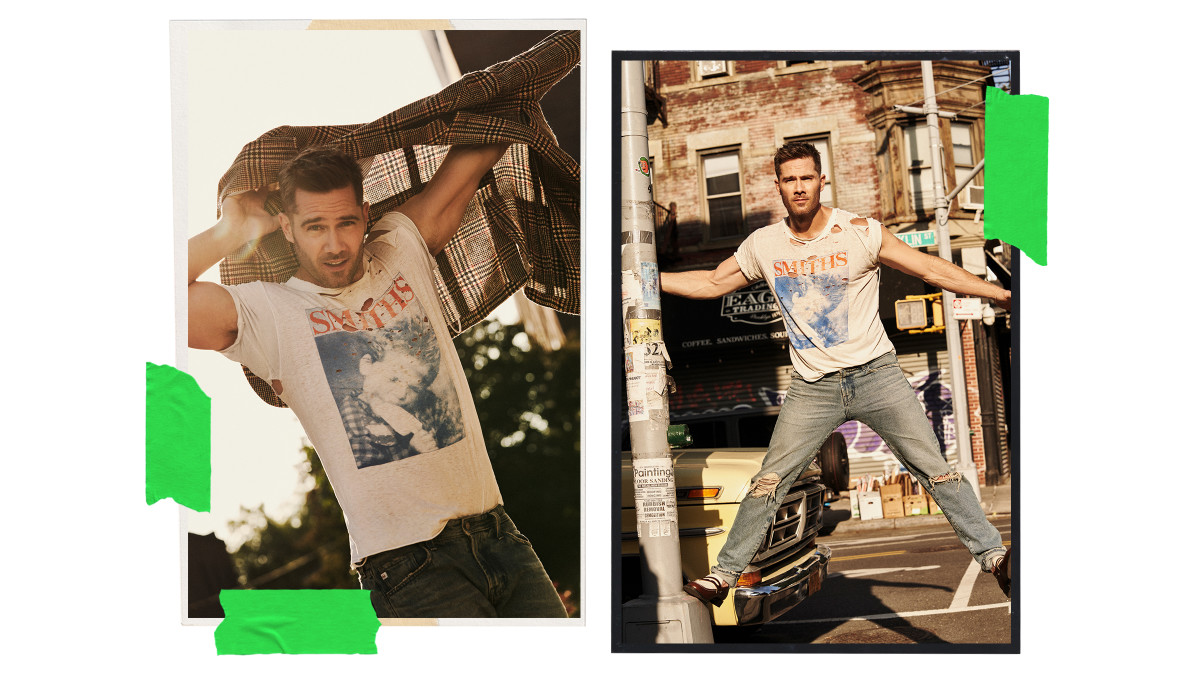
Brooks Brothers sport coat; vintage t shirt; AG jeans;
Duke + Dexter loafers.
"I always tell people, within the Hallmark universe, a lot of people think I'm Tom Cruise."
TR: Anyone who knows me well, knows I'm totally down with a Hallmark movie. I think they're very relaxing. I'm familiar with all of yours. You mentioned to me that you've encountered a snobby response when it comes to the Hallmark work you've done, and that reminded me of my own experience. I was working at Interview Magazine, my first fashion job. After a lot of hard work and years there, a fashion publicist who was looking out for me shared that Cosmopolitan was redoing their fashion POV and team, and were hiring. So I interviewed for an editor position, a jump from assistant, and consequently got the job. It was my first big break and I was able to build my career from there. But I'll never forget the photo director at the time, after I announced that I was leaving, taking me aside at a drinks gathering after hours, and very seriously telling me that the fashion editor I worked under was very disappointed at my choice, the choice to leave a magazine like Interview to go to Cosmo. It was a jarring conversation to have had at the time, but I've always felt solid in that choice, and I've always been 100 percent assured that when it comes to career choices, being open minded has and can afford what can often be overlooked by many as opportunity and growth. Our mindset says something about our choices. And dare I say, I think it's kind of the more enlightened way to be. Am I making sense?
LM: You're making total sense, and I really appreciate you sharing that story with me. It reminds me of a very similar experience. I was working with a director, and the show was coming to an end. I had been offered another Hallmark film. I mentioned it to him, and he kind of was like, 'Oh, you're better than that.' It really stuck with me. Here's the thing for me, and this is not the case for everyone. Work is integrity. For me, labor is integrity. To do the work is where you find joy. It's sort of religious for me.
TR: Your mantra...
LM: Don't delegate, actually do the work, dig the ditch. It's a privileged position to not have to take work. To those who say, 'You shouldn't have done that'...maybe not all of us have, you know, funds in the bank for whatever reason. Work is important. And also, we don't want to judge the people who consume what we make. It means a great deal to the people who are watching Hallmark films. I always tell people that within the Hallmark universe, a lot of people think I'm Tom Cruise.
"I'm no longer contractually obliged to them, although I'm always willing to go and work with them again, for sure."
TR: Yes, you are the Tom Cruise.
LM:That's their world view. I don't think they're totally correct, because their world view might be a little small, but I'm still gonna be me.
TR: .You and I were were talking about how Hallmark has been doing the beloved rom-com that people have been nostalgic for; the '90s rom-com genre was huge, and current culture is thirsty for it again. Hallmark is a TV phenomenon with super fans, as you've described, Can you name the favorite Hallmark films you've done, for all of your fans who would love to hear about that from you?
LM: It's a hard list. I recently gave an interview where I named a film. I'm still very friendly with many of my female co-stars, and one of them saw that interview and said, 'You didn't say Sense, Sensibility + Snowmen?' It's also one of my favorites, but I happened to mention The Mistletoe Promise, a movie I really enjoyed making, with the very glamorous Jamie King, and in it, our characters make an arrangement to pretend to be a couple.
TR: That was a good one.
LM: It came together despite a very tricky film, and I loved that one. And I really love Sense, Sensibility, + Snowmen, just because it has one of the most ridiculous titles of any Hallmark movies I've ever done.
TR: They really get away with those fun titles, don't they?
LM: They really do. I'm always going have a soft spot for the first one I ever did, which was Christmas Land. I got to play a Christmas tree farmer, I mean, come on.
TR: That's the pinnacle. And one of your firsts with Hallmark was The Memory Book?
LM: The Memory Book, that's right. It was a Hallmark movie, but it was not a Christmas movie. It was the early days of Hallmark Movies + Mysteries. They have two channels.
TR: Are you contracted for a certain number of films each year?
LM: Yes. Early on, when I started working for them, they would call me up, and I'd say yes. Then, as I did more and got a little more popular, they created overall deals with me. For example, six movies to be done in a two year period. I just finished my most recent contract with them, which was for, I think, three movies. I'm no longer contractually obliged to them, although I'm always willing to go and work with them again, for sure.
TR: Can you share anything about some of the Hallmark films that are coming up for you this year?
LM: I have a Christmas movie coming out with Alison Sweeney, she also produced it. That's one of the fun things about making Hallmark films. They really give their actors and actresses opportunities to steer things creatively.
TR: That is evident, and I've always found that interesting. Once they develop that relationship with their actors, it seems they allow you be a core part of things.
LM: It's such a rare privilege, especially for all of the actors who've been around for a super long time, yet have never had the opportunity to move into producing. So, Alison Sweeney is the lead in my upcoming Christmas film, and it also stars the amazing Marlo Thomas. It comes out not too far from now.
TR: Hallmark starts rolling out Christmas films like, on Halloween, basically.
LM: Basically. I was kind of relieved that we weren't in that first slot after Halloween, because I feel that's a tough slot. People are like, 'I'm not ready, there's still a pumpkin on my front yard.'
TR: What do you think people would be surprised to know about the making of Hallmark films, behind the scenes, or in terms of the people involved?
LM: That's a really good question. I, I think they'd be surprised at how fast it is. Everyone works very hard, everyone takes it very seriously, and you motor. Allison Sweeney has years and years on the soaps, and in a lot of ways, the soap actors are prepared for the seventeen pages of dialogue a day that you get. It's fast-paced, you really motor through the script, there's not a lot of time. It probably won't come as a surprise to your readers that the Christmas movies are almost always done in the summer. All the snow is fake, and you are boiling underneath those winter jackets, trying to pretend like it's cold. It's a lot of cold-acting.
TR: What have you come to value most about about your Hallmark work?
LM: As actors, we all have instincts, right? We all have a way we think the scene is supposed to go. Sometimes when you work with auteurs, they're sort of trying to get you on board with what their vision is. But with the Hallmark movies, there isn't really time for that conversation, so you go in with your set of instincts about a scene. And what's been very validating, is that I've found that I can trust my instincts, because it works. It kind of comes together, the first attempt at something, works. It's been very validating to know that I can trust my instincts.
"I think that most of the [Hallmark] performers who are seeing Bros are able to laugh at the jokes that we make."
TR: Whom within your Hallmark family of actors, do you call a friend? Have you heard from any of them since the release of Bros, and what have been their reactions?
LM: Erin Krakow reached out to me; she's been following the thing, and has been incredibly encouraging and supportive. She was at Juilliard when I was there, so we go back a really long way. I definitely count her as a friend. Who else do I keep in touch with? Merritt Patterson and I are going to get together sometime soon. She's been incredibly supportive. I think that most of the [Hallmark] performers who are seeing Bros are able to laugh at the jokes that we make.
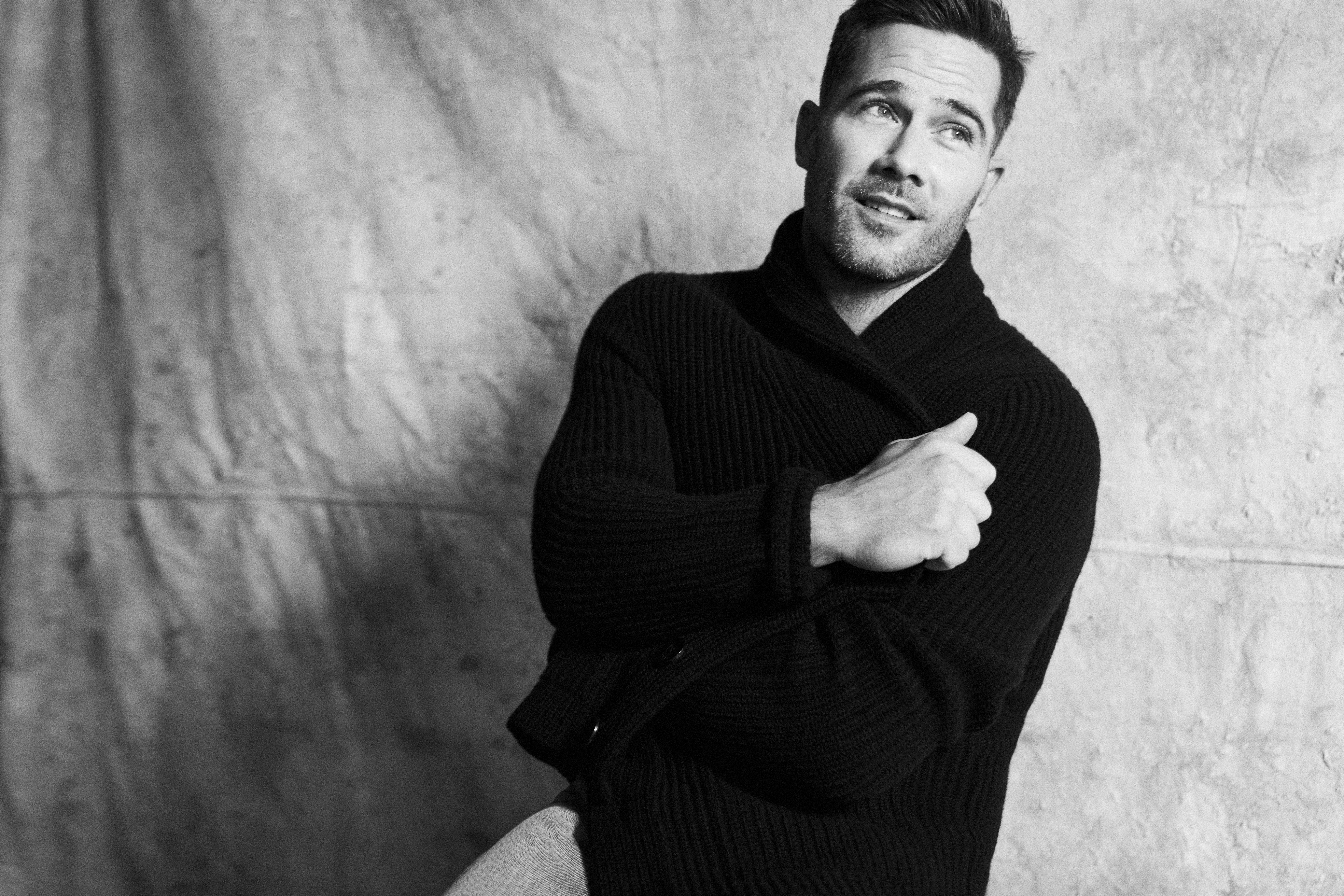
Boglioli Milano cardigan.
"Sometimes when you work with auteurs, they're sort of trying to get you on board with what their vision is. But with the Hallmark movies, there isn't really time for that conversation, so you go in with your set of instincts about a scene."
TR: While watching a screening of Bros, I really felt filled up. I think there's a very hopeful and happy energy to the film that I don't think we've seen in a while. I felt filled up with laughter too, and was thrilled and honored really, to get a first look of something so groundbreaking. Bros checks all the boxes. It's a thoroughly satisfying film. And in Bros, it was also fantastic to see you play a gay man again. There was of course your run on Brothers + Sisters, as key character, Scotty Wandell, the love interest, then boyfriend, then husband, to Matthew Rys' Kevin. For your character, Aaron, in Bros, did you immediately know how you were going to play him? What kinds of things were you thinking about when you were awarded the role? What did you start to draw from, to prepare for the project?
LM: Those are all really great questions. I remember talking with Billy a lot, leading up to playing Aaron, and he kept on reminding me, 'Luke, you're a sensitive, intelligent guy. Aaron's not there yet.' I ended up watching a lot of clips from Brothers + Sisters. I was on YouTube, and someone has compiled all the Kevin-Scotty scenes!
TR: I just watched many of your episodes, so I can imagine all of them. And your look! In 2006. The beginning!
LM: Crazy. It was so funny, going back and watching them, because my [Bros] character, Aaron, had so much to learn from Scotty, you know? He was so comfortable with himself.
TR: From day one.
"I remember talking with Billy [Eichner] a lot, in leading up to playing Aaron, and he kept on reminding me, 'Luke, you're a sensitive, intelligent guy. Aaron's not there yet.' "
LM: From day one! There was a scene where he's on a date with Kevin, early on, and he says something like, 'I've been so gay for so long...I've never had to come out'. I love that for Scotty. For whatever reason he had that confidence to move through the world. Scotty was from Mississippi. I discovered that while re-watching. (Didn't do that accent work, Sorry, ABC!) Aaron wasn't that when we meet him, Aaron didn't have that confidence. He had kind of built a sort of armor around himself to get people to be attracted to him---it's the definition of 'skin deep'. It didn't go super deep, and then eventually it does. That was the fun of developing the character, there is a peeling back of layers. We get to see more and more about who he really is. The first thing, for me, in getting ready for Aaron, was to build that body, embody that physical thing.
TR: Because that's what he leads with.
LM: That's right, the guy that works out. It's an interesting conversation. For him, feeling successful as a gay man is being able to have sex with whomever he wants to. And it was also about making up for lost time. He probably didn't have a girlfriend in high school or in college, so he was kind of making up for that lost time by being very successful, sexually. As far as him being like me, I can definitely relate to a lot of it. I think that Aaron is, maybe, me, in my last year of high school, when I hadn't been encouraged to examine myself the way that I learned to at Juilliard, knowing that my truest self is going to be the most interesting to people.
TR: What is your process like, for getting in the zone for a character you'll play?
LM: I have dyslexia, so I always have to do this thing with the dialogue, I have to make it so second nature to me, and it almost becomes like a melody.
TR: You've memorized it?
LM: ...But in a deep, deep way. I'm always really envious of the actors that can kind of grab the page, look at it, then know it. I just don't have that relationship to words on a page. I've been with actors who say that while they're in scenes they're seeing the script in their mind's eye. I've never been able to do that. In general, so much of my process for getting ready for a character is about deeply taking the lines. Billy and [writer-director] Nick [Stoller] gave me a lot of freedom in Bros. If I wanted to tweak a line or an idea here or there, they would let me do it, just to make it feel better in my mouth. I remember one very specific scene, the scene where I ask Billy to fuck me. Aaron says to Bobby, 'Fuck me.' And I thought, that just doesn't feel right. Then I could see Billy going, like, 'Urghh. You don't want me to fuck you? I get it. You're only a top blah, blah, blah.' And it's like, No---it's not that. It's, 'fuck me', is different than, 'I want you to fuck me'. That felt like a very different idea. 'I want you to', is more vulnerable. This is the thing I want, this is the need. 'Fuck me' almost feels like a demand.
TR: Adding the word 'want' adds complexity.
LM: Yes. And vulnerability, which is what Aaron's character is finally moving towards.
"For for him, feeling successful as a gay man is being able to have sex with whomever he wants to. And it was also about making up for lost time."
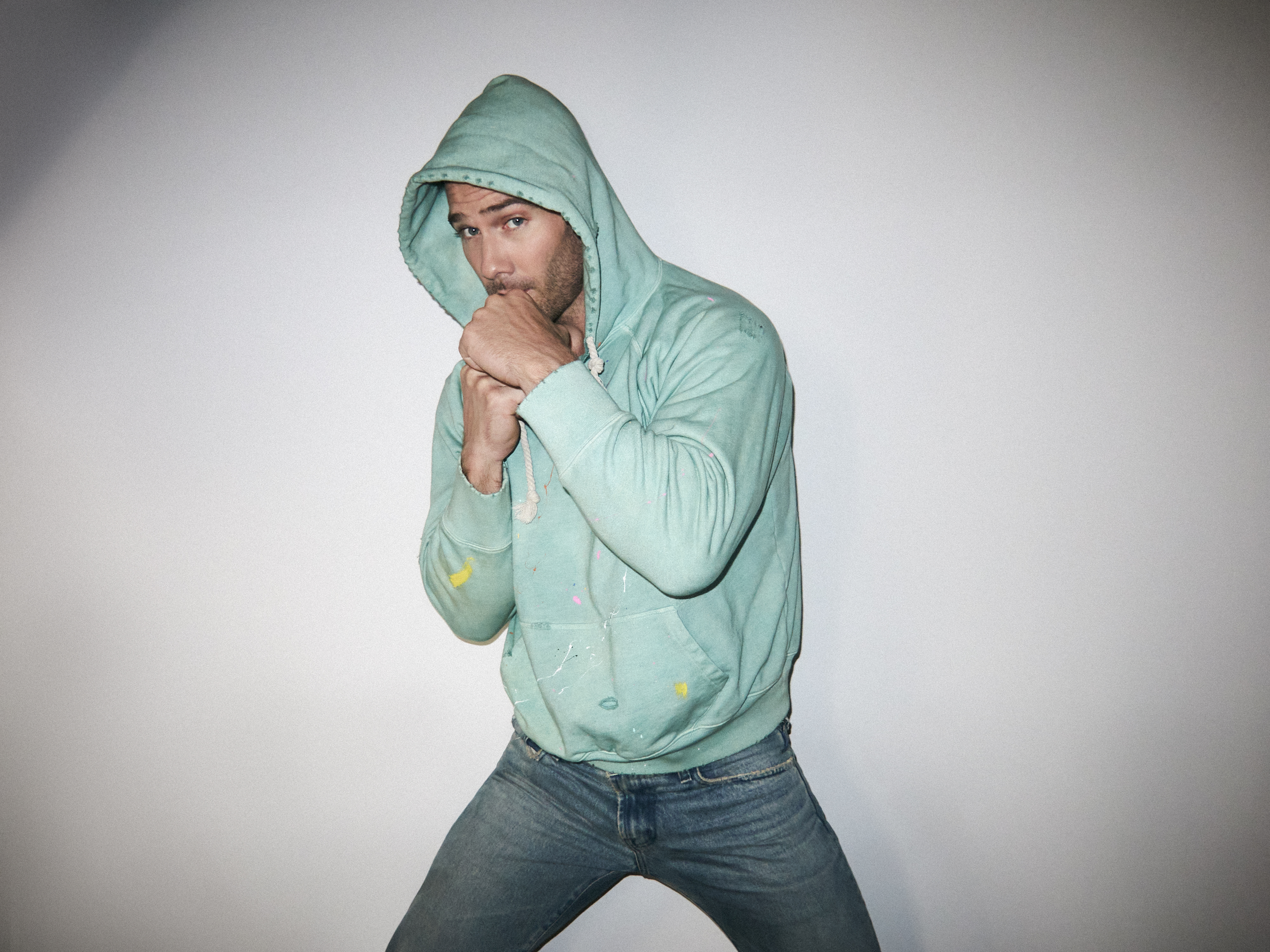
C a m p I s I d r o h o o d I e ; A G j e a n s.
"I think that Aaron is, maybe, me, in my last year of high school, when I hadn't been encouraged to examine myself the way that I learned to at Juilliard, knowing that my truest self is going to be the most interesting to people."
TR: With people like writer-director Nick Stoller and producer Judd Apatow, along with Billy Eichner, at the helm of Bros, what did you experience in terms of that level of talent in film making?
LM: I kind of expected to be told that this is the way things are going to be. It was was going to be very curated, and I was just going to sort of step in. I was amazed by, in working with people at a high level, how much responsibility I was given, right down to what I was going to wear. That, to me, is a great lesson. People with real power are able to give it away a little bit. They're not forcing you into a sort of thing. That was totally surprising to me. I fully expected to just walk in and be a cog in the machine. They let me be a collaborator. That was very unexpected.
TR: How do you think it's raised the bar for you, in terms of what your future endeavors will be?
LM: Our careers are such mysteries. I've learned a tremendous amount, my gosh, just going on this press tour. I don't know how many actors have had that kind of experience; the whirlwind of exposure. I really don't know what kind of opportunities may or may not be offered to me moving forward.
TR: Hallmark is in fact referred to throughout Bros. What were the conversations like, or not like, around that choice? Were you involved in it at all?
LM: Not really. I remember advising Nick, when he was planning to do the little vignettes of 'A Holly Polly Christmas'. I said, 'You know, one of the tricks of a Hallmark movie, is that you have to have Christmas in every shot.' He was like, 'What do you mean??' In every shot, there has to be something Christmas-y that's visible. I also remember that one day, on set, when I was making the little chocolates, he was like, 'Come on, you must have done baking on Hallmark, at some point.' I thought, no, and then: yes. I actually have done baking on Hallmark before. With Jean Smart. Jean Smart, in A Shoe Addict's Christmas with Candace. Cameron Bure.
TR: There is always baking in Hallmark Christmas films.
LM: Because that is Christmas...
"I was amazed by, in working with people at a high level, how much responsibility I was given, right down to what I was going to wear. That, to me, is a great lesson. People with real power, are able to give it away a little bit.
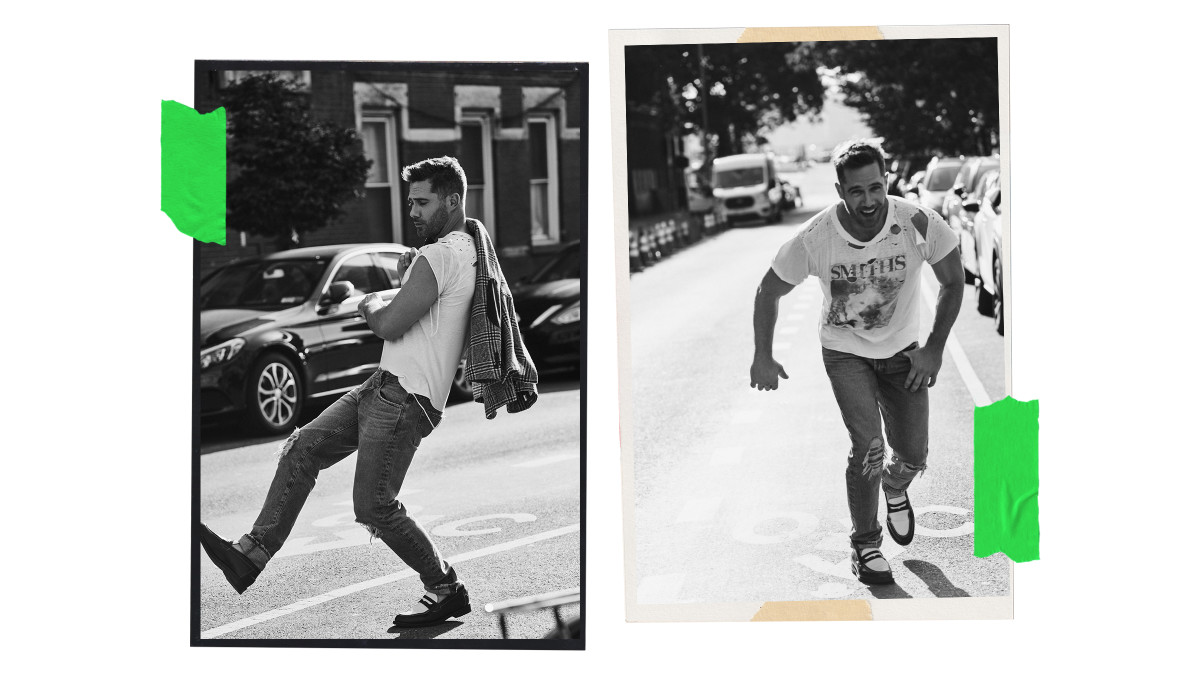
Vintage t shirt; AG jeans; Brooks Brothers sport coat; Duke + Dexter loafers.
TR: What were the aspects of making Bros that you felt are one-of-a-kind? Opportunities, moments, experiences, things that will remain close to you?
LM: This sounds kind of small, but there's nothing like a crane shot on Central Park West. The movie ends with Billy and I holding hands and walking down Central Park West. A beautiful New York City landmark, with a big crane flying up, the music going. That just feels so singular. I remember that day of filming and thinking, whoa.
TR: What have been some notable reactions to the film, and to how you play Aaron?
LM: My sister told me that I have a very stiff run, [laughs] which is totally true. Five minutes after the screening at Toronto International Film Festival, she was like, 'Hey, who am I? ' And she does my little run. That's fine, I get it! There have been a lot of really sweet responses that people have sent to me via DM's, saying things like, 'I saw myself in this gay man, in Aaron, and thank you.' So that's been very nice.
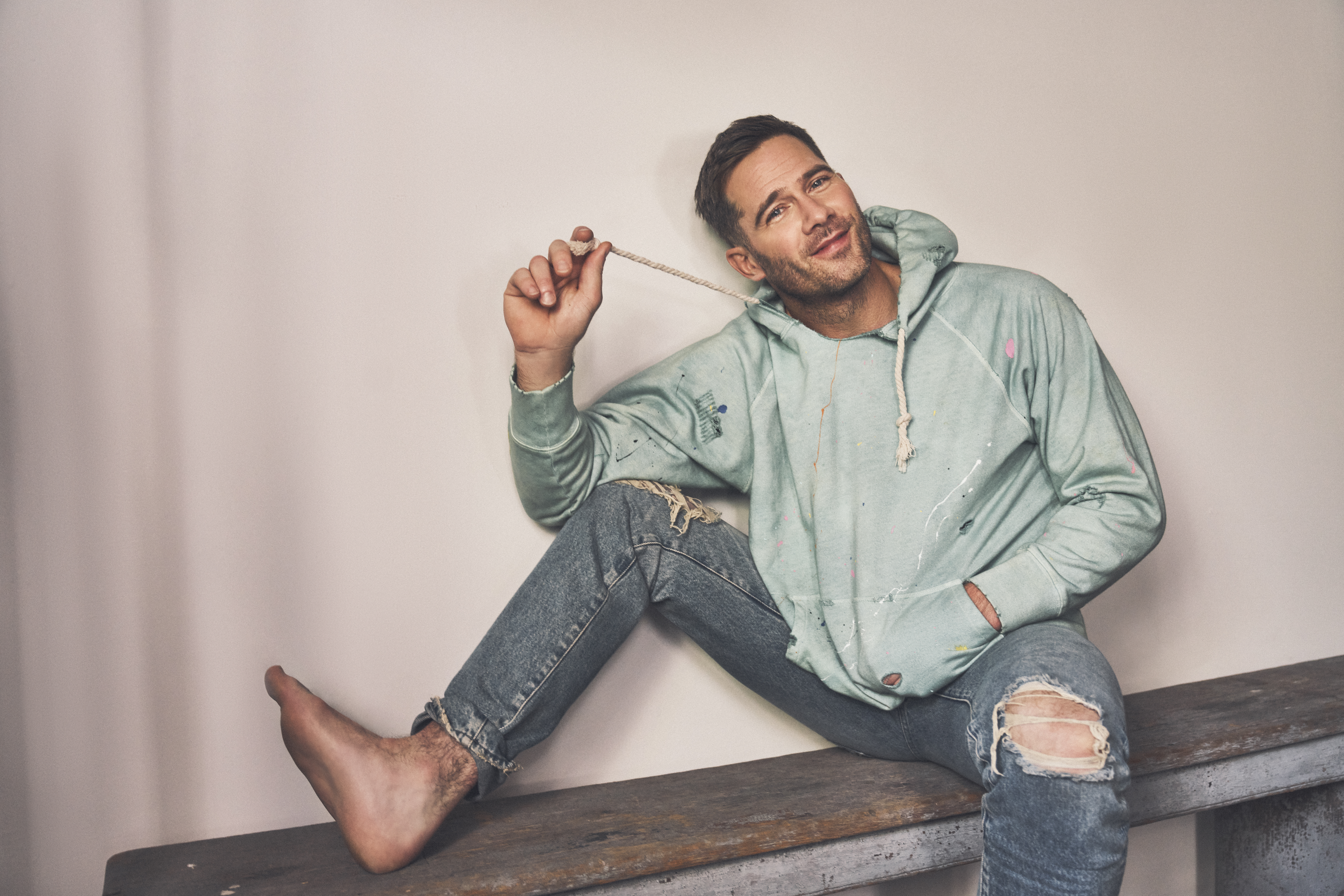
Camp Isidro hoodie; AG jeans.
"My first thought, perhaps selfishly, is, why am I the guy who is getting these opportunities? The truth is, because I'm an openly gay actor, and I guess that is still sort of a rare thing."
TR: It's a pivotal time in your life and career. When things are quiet and you're not on the whirlwind press tour that you've been on, how are you feeling?
LM: Especially in this last week, I remember feeling a little anxious. I had a bit of a cold and I didn't have the energy to go to the gym. I realized that being active in the gym is really important for my mental health. It's somewhere to put that energy, to take that anxiety and put it somewhere. Being active as much as I can, pouring all my love into my dog...These are such cliches, but help.
TR: It was so much fun to re-watch the Ken Olin executive produced Brothers + Sisters for this interview. It ran from 2006 to 2011, it was filled with notable stars and guest stars, a total ensemble. People fell in love with your character, Scotty, the partner of Matthew Rhys' character, Kevin. Kevin struggled with aspects of being out, and while Scotty was strong and self-assured, he had parents that had some difficulty with how he was living his life. Your story line included Scotty's parents not being accepting of his commitment ceremony, a theme presented at a time when gay marriage wasn't an option. Commitment ceremony, remember that? Your story line also included struggles with surrogacy, and miscarriage, and fostering a child. Being a lead in Bros, you're a part of groundbreaking film, and all those years ago, you were a part of groundbreaking television. Does it feel like some version of a 360 moment?
LM: It's so interesting to hear you put it that clearly. You're right. My first thought, perhaps selfishly, is, why am I the guy who is getting these opportunities? The truth is, because I'm an openly gay actor, and I guess that is still sort of a rare thing. ...Everything you said; it's a privilege to be part of those stories and I'm so grateful to have been part of those things that have been watched and received well. I think selfishly, as actors, we always desire the ability to be more transformative and disappear into a character. That's not to diminish or take away anything from either Aaron or Scotty, but I do long for the day when I won't have to celebrate this special-ness of narrative. It'll just be a part of collective storytelling.
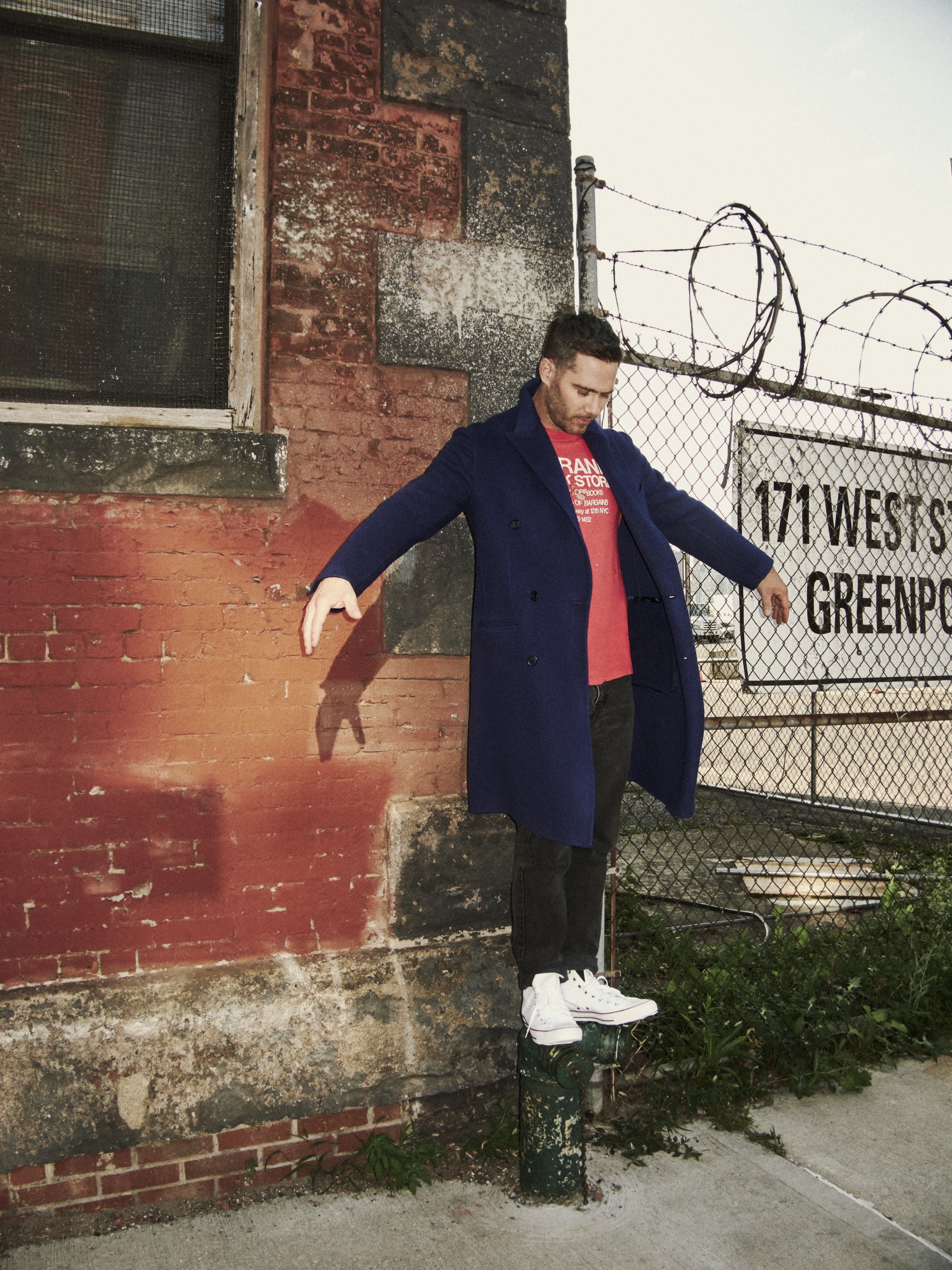
B r I o n I c o a t ; v I n t a g e t s h I r t ; L e v I ' s j e a n s ; C o n v e r s e s n e a k e r s.
"Honestly, in between Brothers + Sisters and Bros, I've done three television series. Cumulatively, that's almost a hundred episodes of shows that I've worked very hard on. Yet Hallmark is the thing that burst through."
TR: What was it like working on Brothers + Sisters? You must have been left with some great tools and some great memories. What do you think about, when you think about that time?
LM: I remember, very early on, being tremendously nervous. I remember being very, very nervous. We used to do a table read for every single episode, and we'd all gather around together. I'd always be very nervous about delivering well at the table read. As things went on, it became this incredible opportunity to see different actors at very high levels. When Rob Lowe joined the cast, I thought, 'This is Rob Lowe. He's just a guy, sitting around in his cast chair.' Keep in mind, this was before like everybody had iPhones. When you were on set, you sat around and chatted with people. I miss those days. I learned so much from people like Rob and Calista [Flockhart] and Sally [Field], sitting together, on those chairs. Sally used to read on set. I was like, 'I'm going to start reading on set. I used to read books, get through novels, on set. I can barely get through a book now, especially on set. So I have nostalgia for those before-cell-phones days. I think specifically what I learned from Sally---going back to what I was saying earlier about the importance of work and labor and just doing the work---was that she always had a kind of contractor-laborer attitude toward doing the work. She was always prepared, and it was also sort of muscled, and thoughtful. I really learned a lot from her in that way.
TR: Has it been interesting now, to reflect on all that time that came in between Brothers + Sisters and Bros? How do you kind of characterize it?
LM: I think of that time in between, as my years of learning more about who I am, getting more confident with who I am, and learning to have more confidence about how to be on set. As far as artistic contributions, they've been a little less obvious, you know, with the exception of Hallmark, which still, to this day, blows my mind. Especially doing this press tour. It's what people want to talk about. It broke through, you know? Honestly, in between Brothers + Sisters and Bros, I've done three television series. Cumulatively, that's almost a hundred episodes of shows that I've worked very hard on. Yet Hallmark is the thing that burst through.
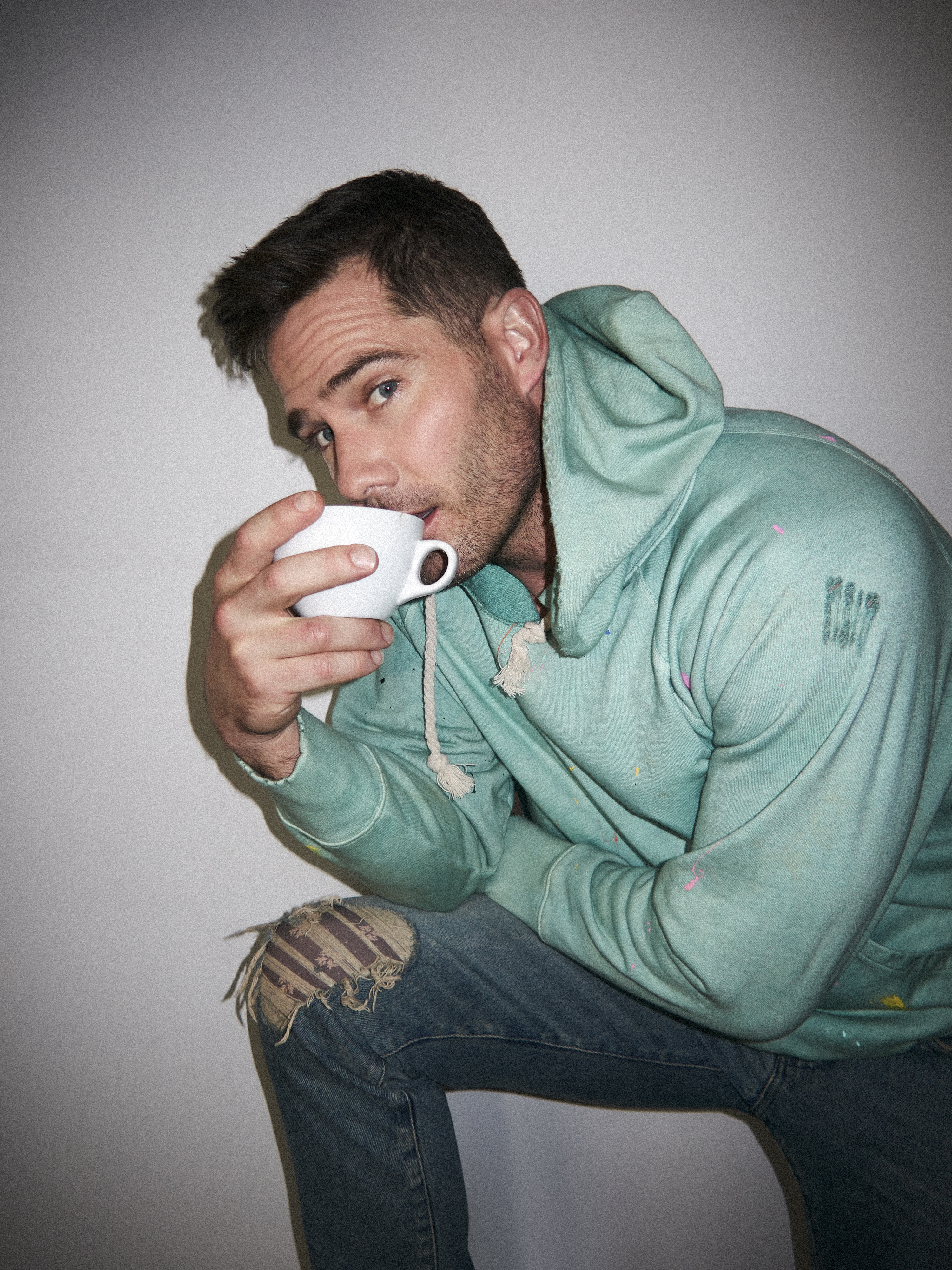 C a m p I s I d r o h o o d I e ; A G j e a n s .
C a m p I s I d r o h o o d I e ; A G j e a n s .
"We all have ideas about where we want to head, but then we also look down the road, and follow where the road is guiding us a little bit, too."
TR: Was there a point recently, when you made a conscious decision to mix things up in your career? Had you decided to spend more time looking for roles outside of those coming to you from your Hallmark family?
LM: It's always a little bit of everything. We all have ideas about where we want to head, but then we also look down the road, and follow where the road is guiding us a little bit, too. It's always going to be a little bit of a mix.
TR: Up next for you is your role as Charlie, husband to Rose Byrne's character Sylvia, in Apple TV+'s comedy series, Platonic, written and directed by Nick Stoller who just directed you in Bros. The series also stars Seth Rogan, and finished shooting last month.
LM: That opportunity came along because Nick and I really enjoyed working together, and he gave it to me, and I was not going to turn down an Apple show! It's an opportunity to play a family man in a traditional family setting, and that's really exciting for me. But it would be disingenuous of me to say that it was a conscious choice to 'move away'. Our lives and our careers are always a little bit of a mix, a little bit of choice, and a little bit of whimsy.
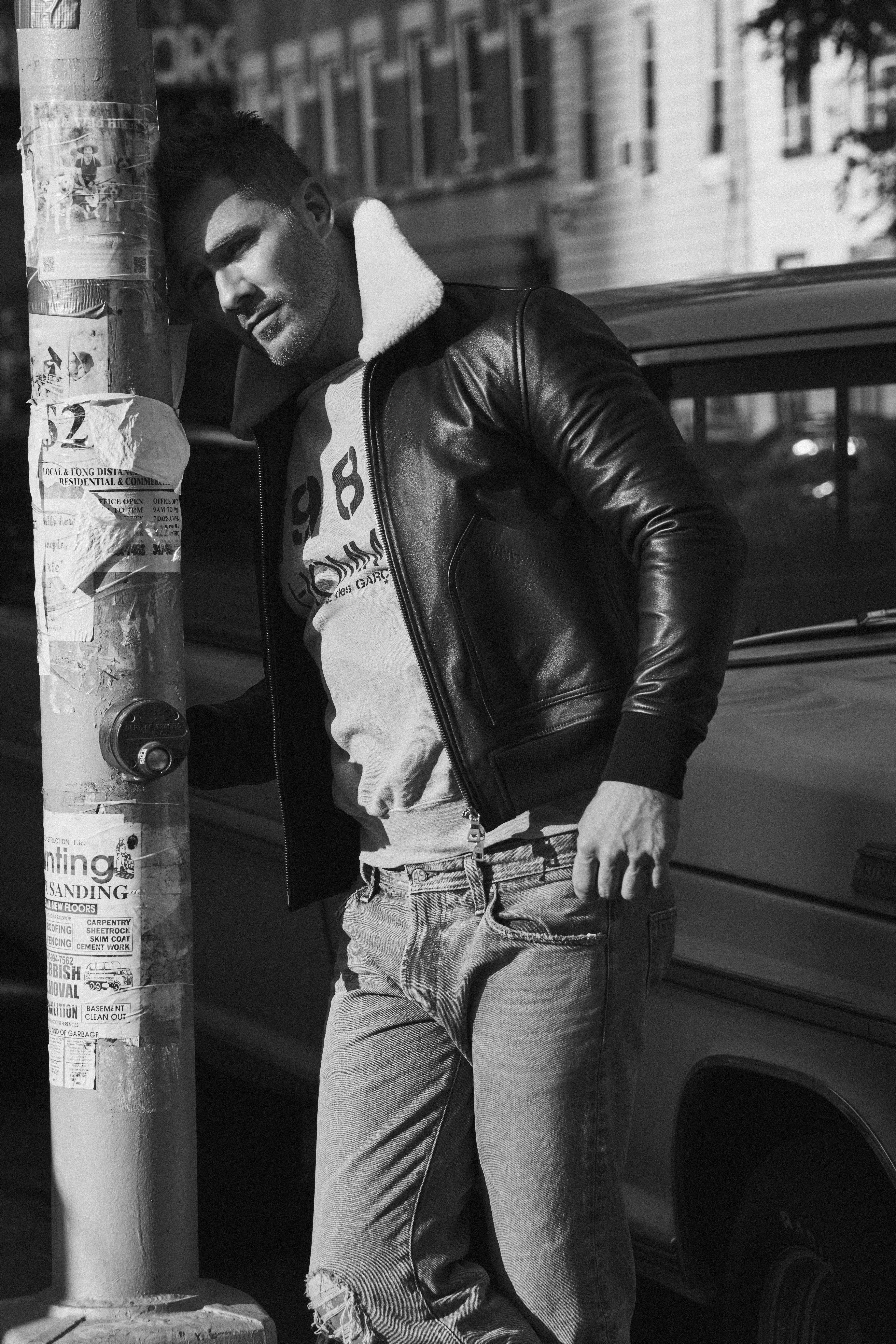
M r . P . j a c k e t; v I n t a g e t s h I r t ; A G j e a n s .
"I would love to be part of the big action universe. I love those movies. I love what they stand for."
TR: I know you can't share too much about Platonic, but how are the themes of platonic friendships similar, and how are they different, from your own experience?
LM: Platonic, essentially and at its core, is the theme, can men and women be friends? It's the question that's posed in When Harry Met Sally. The show is the explanation of that. Can Rose Byrne's character and Seth Rogan's character be friends, and does their friendship kind of freak everyone else out? In my mind, the show is very much Rose's character's journey as a woman who has dedicated herself to her family, and is feeling a little bit like something's missing. She reconnects with a college buddy, Seth Rogan's character. Very fortunately, as a gay man, I get to kind of be friends with whomever I want. I do not feel the social constraints in the ways that a lot of people feel. I guess I feel very lucky that way. Also, I'm an artsy guy living in Los Angeles. So I've never felt particularly stressed about who I can or can't be friends with, including my ex's.
TR: Where are you in terms of what you want for your career and where you want to see it go? Will you continue to cast the net wide, or is there a genre you hope you can focus on? Or is your point of view just to kind of stay diverse?
LM: It's always important to say what you want to do, so I'm going say what I want right now. I'm also being realistic that, you know, things will come up. I would love to be part of the big action universe. I love those movies. I love what they stand for. I love action and physicality, so I would love to be part of something like that. Will that opportunity come around? I don't know, but that would be something I would love to be part of.
TR: A lot of press around Bros includes the movie star presence that people see in you. Do you allow yourself to think about that?
LM: I will 100% take it. I don't know what it means, but thank you very much. I'm nodding with gratitude.
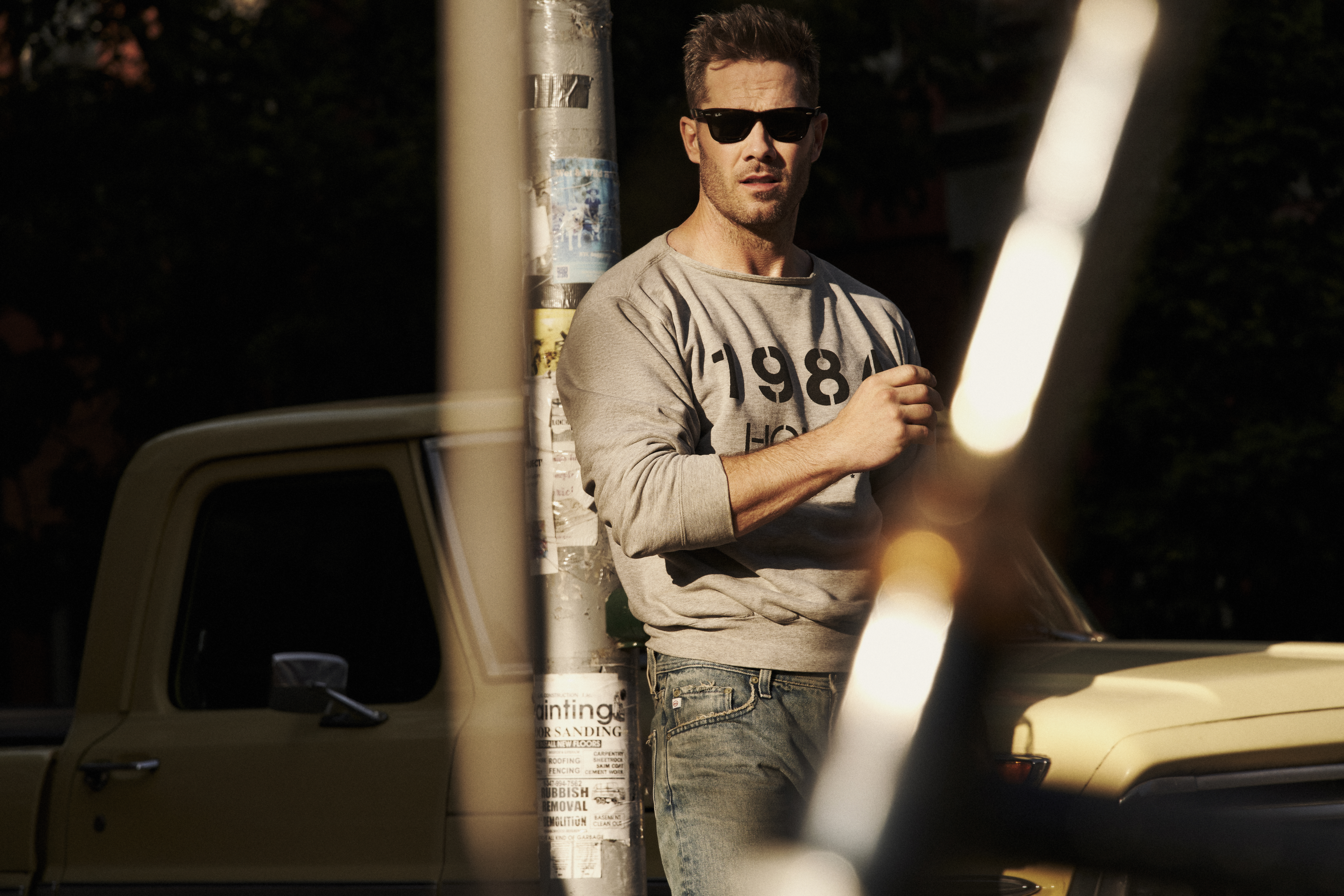
Vintage sweatshirt; AG jeans; Ray-Ban sunglasses.

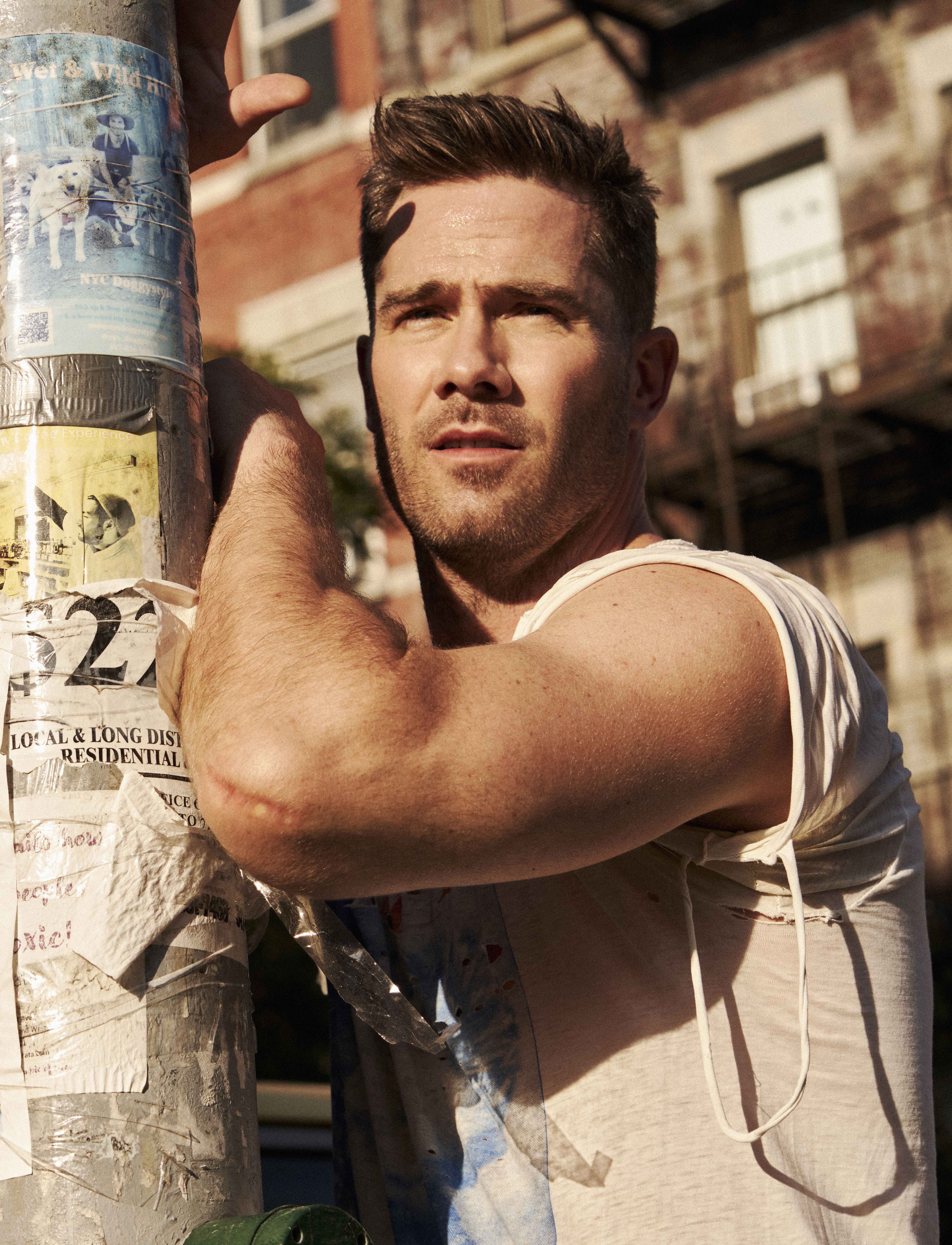
#BTS
OCTOBER 2022 COVER
LUKE MACFARLANE
LOCATION
BROOKLYN, NYC
PHOTOGRAPHER
DEAN ISIDRO
DE FACTO
STYLIST + FASHION DIRECTOR | MEN
SAM SPECTOR
GROOMING
ERIN ANDERSON
EXCLUSIVE ARTISTS
ASSISTANTS PHOTO | ALEX KALB, MIKE PARDO FASHION | KATIE VAUGHAN
